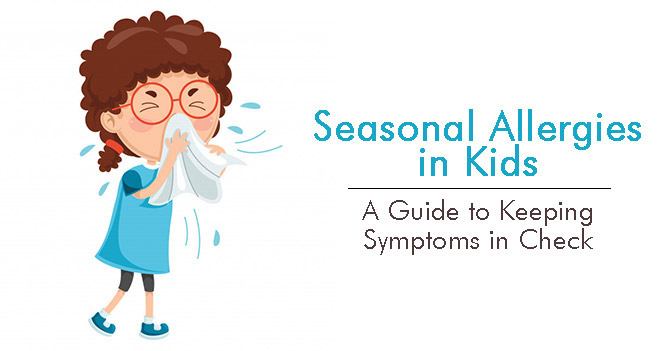Every spring, five-year-old Neha develops a runny nose, itchy, puffy eyes, and attacks of sneezing. Her mother shares the same problem, which she dismisses as mild hay fever. Lately, Neha has also suffered attacks of wheezing when she visited her grandmother and played with her cats. Neha’s paediatrician’s suspects allergic asthma. The doctor further explained that the child’s symptoms are by no means rare among children and in many cases, the condition starts in childhood and goes away later in life.
What are Seasonal Allergies?
Seasonal allergies, often called ‘hay fever’ or seasonal allergic rhinitis, are allergy symptoms occurring during certain times of the year, particularly when outdoor molds release their spores and grasses, weeds, and trees release tiny pollen particles into the air to fertilize other plants. The immune systems of those individuals who are allergic to mold spores or pollen, react to this invasion by releasing chemicals, including histamine, into the bloodstream as a defence mechanism. It’s the release of these chemicals that results in the allergy symptoms.
People can be allergic to one or more types of molds or pollens. Symptoms are an indication of the type of allergen. Such allergies can start at any age. Children who’ve never had seasonal allergies in the past can suddenly develop them. Usually, they develop by the time someone has turned 10 years old and reach their peak in the early 20s. The symptoms often disappear later in adulthood.
When to Suspect an Allergy
Some allergies can be identified easily by the pattern of symptoms that follows exposure to a particular substance. But others are usually more subtle and may masquerade as other conditions. Here are some of the common clues that could lead you to suspect that your child may be suffering from an allergy. Repeated or chronic cold-like symptoms that last over a week or two or that develop at about the same time annually. These may include the following:
- Runny nose
- Sneezing
- Nasal stuffiness
- Throat clearing
- Sniffling
- Sneezing
- Nose rubbing
- Snorting
- Itchy, runny eyes
Itching and/or tingling sensations in the throat and mouth is a hallmark of an allergy. Coughing, difficulty breathing, wheezing, along with recurrent itchy, dry, scaly rashes in the creases of the skin may indicate an allergy.
Four Must-Dos for Kids with Seasonal Allergies
The good news is that there are some simple things that you can follow to make your child — and anyone else in the house who has hay fever — feel better.
Close the windows
After a long winter, it is tempting to open them, but don’t — the fresh air brings pollen with it. If you have an air conditioner, switch it on.
Wash up and change when you get home
People who are prone to allergies must change clothes and wash their hands and faces when they come in, but it is a good idea for everybody to follow the same routine, as all of us can be pollen-carriers. The idea is to keep the house as pollen-free as possible. It is a good idea to bathe your child before he/she goes to bed.
Be thoughtful about outside time
If your child frequently suffers from an allergy, think before sending your child outside. Dry and windy days are the worst. It is also advisable to avoid places with lots of plants. Many weather sites and apps have local pollen counts; check them when making outdoor plans.
Use medication the right way — and talk to your doctor if it’s not working
When it comes to taking medications for relieving symptoms like sneezing or itchy eyes, we often tend to follow the start and stop approach – stopping the medications as soon as the symptoms go away. But it turns out that allergy medications work best when you keep taking them consistently.
So, while it’s understandable that you’d want to avoid taking medications until things get bad, and skip them when things look fine, your child is more likely to do better if you get them started at the first sniffle — and continue until the allergy season is over. Consult your doctor as to when you should stop.
These days, most common allergy medications are available without a prescription, so it may not occur to parents to consult a doctor when the allergy season hits; they simply head to the pharmacy. If the medicine you have bought is working, great. But if not, give your doctor a call —sometimes altering the dose or changing the medication can make all the difference.
If your child is suffering from seasonal allergies, the right paediatrician can help you find the perfect solution. And when children feel better, as parents you will too. With the right precautions, you can enjoy the spring too!



